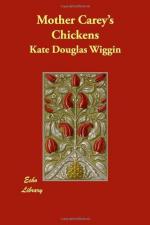JACK OF ALL TRADES
Mr. Ossian (otherwise “Osh”) Popham was covering the hall of the Yellow House with the hayfield paper. Bill Harmon’s father had left considerable stock of one sort and another in the great unfinished attic over the store, and though much of it was worthless, and all of it was out of date, it seemed probable that it would eventually be sold to the Careys, who had the most unlimited ingenuity in making bricks without straw, when it came to house decoration. They had always moved from post to pillar and Dan to Beersheba, and had always, inside of a week, had the prettiest and most delightful habitation in the naval colony where they found themselves. Beulah itself, as well as all the surrounding country, had looked upon the golden hayfield paper and scorned it as ugly and countrified; never suspecting that, in its day, it had been made in France and cost a dollar and a half a roll. It had been imported for a governor’s house, and only half of it used, so for thirty years the other half had waited for the Careys. There always are Careys and their like, and plenty of them, in every generation, so old things, if they are good, need never be discouraged.
Mr. Popham never worked at his bricklaying or carpentering or cabinet making or papering by the hour, but “by the job”; and a kind Providence, intent on the welfare of the community, must have guided him in this choice of business methods, for he talked so much more than he worked, that unless householders were well-to-do, the rights of employer and employee could never have been adjusted. If they were rich no one of them would have stopped Ossian’s conversation for a second. In the first place it was even better than his work, which was always good, and in the second place he would never consent to go to any one, unless he could talk as much as he liked. The Careys loved him, all but Julia, who pronounced him “common” and said Miss Tewksbury told her never to listen to anyone who said “I done it” or “I seen it.” To this Nancy replied (her mother being in the garden, and she herself not yet started on a line of conduct arranged to please the angels) that Miss Tewksbury and Julia ought to have a little corner of heaven finished off for themselves; and Julia made a rude, distinct, hideous “face” at Nancy. I have always dated the beginning of Julia’s final transformation from this critical moment, when the old Adam in her began to work. It was good for Nancy too, who would have trodden on Julia so long as she was an irritating but patient, well-behaved worm; but who would have to use a little care if the worm showed signs of turning.
“Your tongue is like a bread knife, Nancy Carey!” Julia exclaimed passionately, after twisting her nose and mouth into terrifying and dreadful shapes. “If it wasn’t that Miss Tewksbury told me ladies never were telltales, I could soon make trouble between you and your blessed mother.”
“No, you couldn’t,” said Nancy curtly, “for I’d reform sooner than let you do that!—Perhaps I did say too much, Julia, only I can’t bear to have you make game of Mr. Popham when he’s so funny and nice. Think of his living with nagging Mrs. Popham and his stupid daughter and son in that tiny house, and being happy as a king.”




